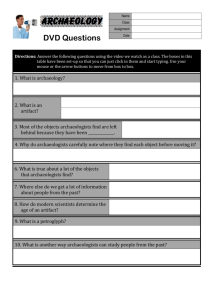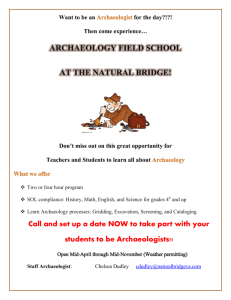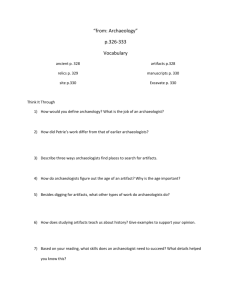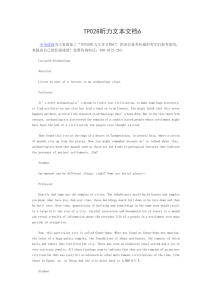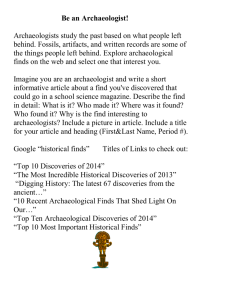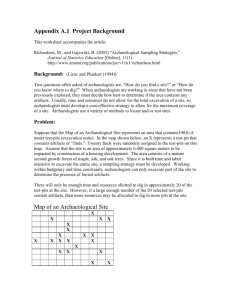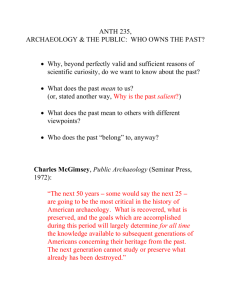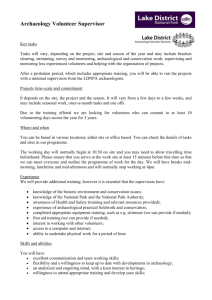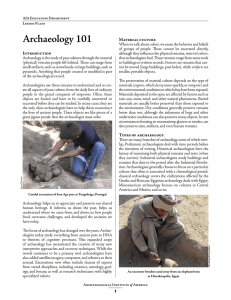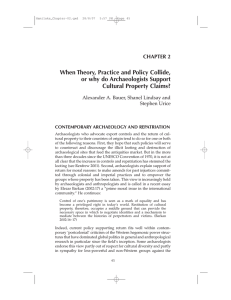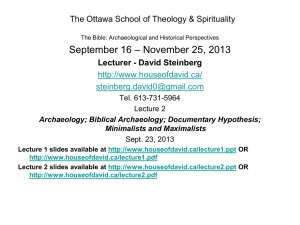Archaeology - Beacon Media
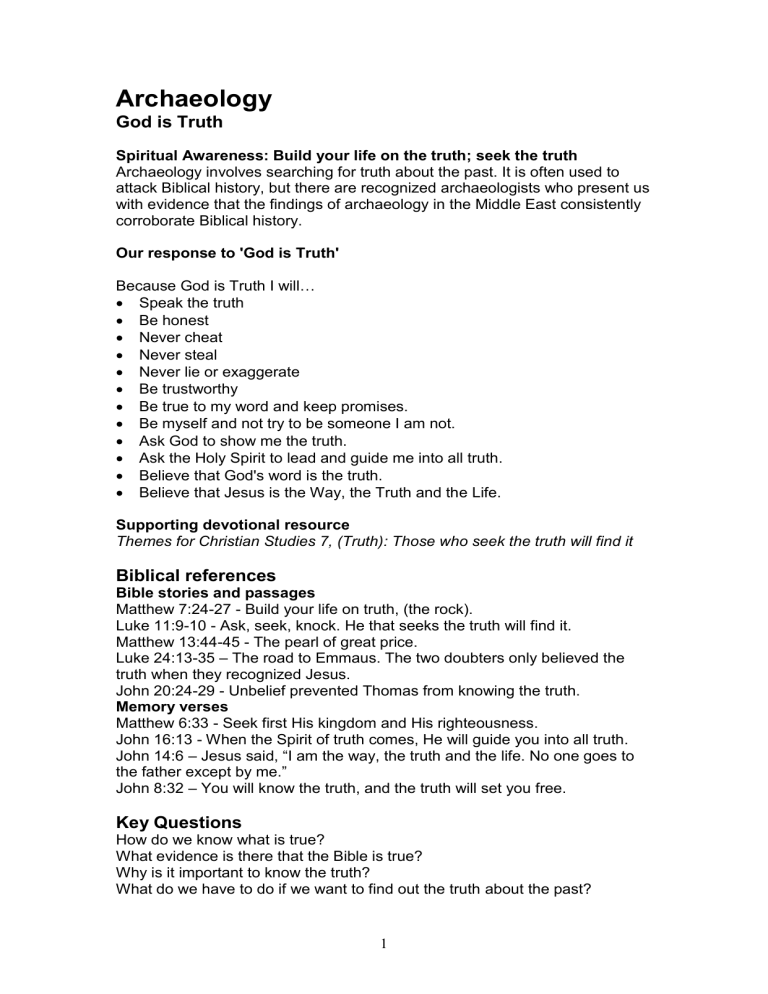
Archaeology
God is Truth
Spiritual Awareness: Build your life on the truth; seek the truth
Archaeology involves searching for truth about the past. It is often used to attack Biblical history, but there are recognized archaeologists who present us with evidence that the findings of archaeology in the Middle East consistently corroborate Biblical history.
Our response to 'God is Truth'
Because God is Truth I will…
Speak the truth
Be honest
Never cheat
Never steal
Never lie or exaggerate
Be trustworthy
Be true to my word and keep promises.
Be myself and not try to be someone I am not.
Ask God to show me the truth.
Ask the Holy Spirit to lead and guide me into all truth.
Believe that God's word is the truth.
Believe that Jesus is the Way, the Truth and the Life.
Supporting devotional resource
Themes for Christian Studies 7, (Truth): Those who seek the truth will find it
Biblical references
Bible stories and passages
Matthew 7:24-27 - Build your life on truth, (the rock).
Luke 11:9-10 - Ask, seek, knock. He that seeks the truth will find it.
Matthew 13:44-45 - The pearl of great price.
Luke 24:13-35 – The road to Emmaus. The two doubters only believed the truth when they recognized Jesus.
John 20:24-29 - Unbelief prevented Thomas from knowing the truth.
Memory verses
Matthew 6:33 - Seek first His kingdom and His righteousness.
John 16:13 - When the Spirit of truth comes, He will guide you into all truth.
John 14:6 – Jesus said, “I am the way, the truth and the life. No one goes to the father except by me.”
John 8:32
– You will know the truth, and the truth will set you free.
Key Questions
How do we know what is true?
What evidence is there that the Bible is true?
Why is it important to know the truth?
What do we have to do if we want to find out the truth about the past?
1
How can we seek for truth?
What evidence do Christian archaeologists give to show that the Bible is true?
How does evolutionary thinking lead to a false understanding of the past?
Outcomes
Students will
Knowledge
understand the definition of archaeology
understand the types of objects archaeologists investigate when studying the lives of early people
understand that archaeological specimens can give us an understanding of how people lived in the past
understand that through archaeology we can discover important contributions to the advancement of technology that have been made by people from a range of cultures
be able to explain the carbon dating method and the views of creation scientists on carbon dating
Skills
explain how archaeologists locate, survey and excavate sites
sequence historical people and events
identify questions to inform an historical inquiry
compare information from a range of sources
investigate and research
use a range of communication forms (oral, graphic, written) and digital technologies to describe famous finds
Values
pursuit of knowledge
using evidence to find truth
Activities
List the types of objects that archaeologists investigate e.g. artifacts, features and ecofacts.
Discuss and research the activities of archaeologists.
Conduct a simulated 'dig', (set up by teacher in a sandpit), complete with layers of simulated artifacts. Students 'find' objects in the sandpit, e.g. pottery, crockery, cutlery, coins. After all the objects have been found, they can be displayed on a table. Students can use their imagination to link the object to an actual archeological discovery. They must describe, label, date and interpret the object.
Examine photos and watch videos of famous archaeological finds.
Research some famous finds e.g. Dead Sea Scrolls, Tutenkhamen's tomb,
Schliemann and Troy, army of statues found near Xian in China, Yucatan pyramids, Australian Aboriginal middens (marine life), Abraham's Ur,
Machu Pichu, Pompeii, Jerusalem, Egypt, Easter Islands, Knosos.
Research the Neanderthal skull, a socalled ‘sub-species’ of human beings. Argue the conclusions drawn by most archaeologists. http://www.bbc.co.uk/sn/tvradio/programmes/horizon/neanderthal_prog_su mmary.shtml
2
Make a list of findings related to Biblical history e.g. excavations of Jericho,
Ur, Jerusalem, Corinth, Ephesus, Rome, Capernaum.
Investigate underwater excavations
Mark famous archaeological finds on a world map.
Assessment
1. Record and present findings from the ‘dig’ in table form.
2. Present research on famous findings from a particular location.
3. What have I learned from the study of archeology…
about God?
about the Bible?
about doing what God wants me to do?
Link with Australian Curriculum
Science Year 6: Science as a human endeavour Science involves testing predictions by gathering data and using evidence to develop explanations of events and phenomena
Learning connections
English: Write a narrative about an archaeological excavation.
Art: Make clay models of artifacts from ancient cultures.
Maths: Investigate number systems of ancient cultures.
3

